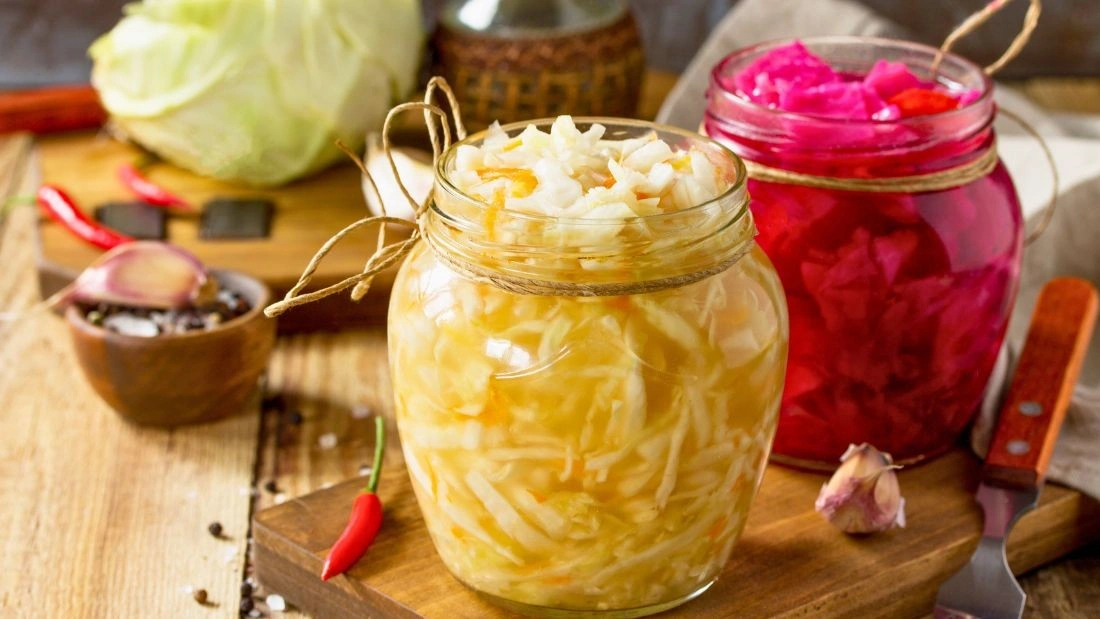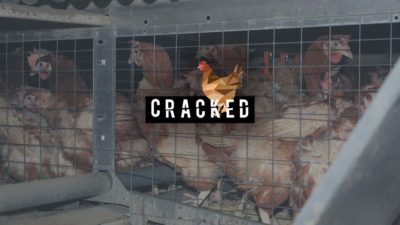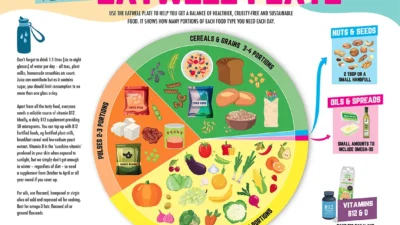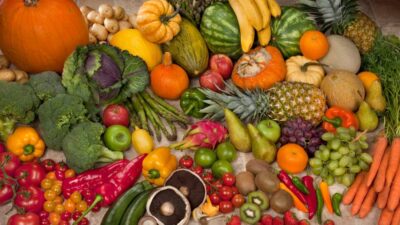Fermented foods – ten of the best

Fermented foods are made by adding microbes such as bacteria and yeast, which then convert the sugars in food into energy and by-products such as ethanol, carbon dioxide and organic acids. The increased acidity gives fermented foods their tangy taste and helps preserve food by preventing the growth of other, harmful microbes. Some fermented foods, but not all, contain probiotics – living microbes that support gut health.
Fermentation dates back around 9,000 years, originally used to preserve foods for times of scarcity. Today, fermented foods are known for their health benefits – they can be rich in probiotics and nutrients that support gut health, immunity and overall wellbeing.
Globally, over 5,000 fermented foods exist. Here are 10 of the best vegan options and their key benefits:
1. Sauerkraut
Sauerkraut, meaning ‘sour cabbage’ in German, is finely shredded cabbage fermented with salt. Commonly used on Reuben sandwiches and hot dogs, it also pairs well with vegan sausages, burgers, baked potatoes, salads and more.
Low in calories and fat, sauerkraut is rich in vitamins C and K, iron, folate and fibre. Live sauerkraut contains probiotics that support gut health, immunity and may benefit heart and bone health.
Sauerkraut, however, can be high in salt so limit your intake if you have high blood pressure. Sauerkraut, aged cheeses and cured meats should all be avoided by people taking MAOIs (antidepressant medication) as they can interact with the drugs leading a dangerous increase in blood pressure. Unpasteurised sauerkraut is not recommended for pregnant or immunocompromised individuals.
2. Kimchi
Kimchi is a spicy fermented Korean vegetable mix, usually made with cabbage and radish but it sometimes contains fish sauce, so check the label. Originating in Korea over 1,000 years ago, this hot, sour and salty condiment adds a burst of flavour as a side dish or added to burgers, sandwiches, soups and stir-fries.
Rich in vitamins A, C and K, plus iron, calcium, magnesium, potassium and fibre, kimchi also contains probiotics that support gut health and may ease bloating and digestive issues. It may also help lower cholesterol, regulate blood sugar, support brain and skin health and reduce cancer risk through anti-inflammatory and antioxidant effects.
Kimchi is also high in salt and can pose a food poisoning risk if not prepared or stored properly, especially in immunocompromised individuals.
3. Kombucha
Kombucha is a lightly carbonated drink made by fermenting sweet tea with a SCOBY (symbiotic culture of bacteria and yeast).
Originating over 2,000 years ago in Northeast China, it’s rich in probiotics and antioxidants that may aid digestion, support immunity and reduce inflammation.
Shop-bought versions can be high in sugar or sweeteners so check the label.
4. Tempeh
Originally from Indonesia, tempeh is made by fermenting pre-soaked soya beans with the fungus Rhizopus to form a firm cake. It has a nutty, mushroom-like flavour and works well in stir-fries, stews, sandwiches or as a bacon substitute.
Easier to digest than tofu, tempeh is high in fibre, B vitamins, iron, calcium and protein and because it’s made from soya, it contains all the essential amino acids. Though cooking kills probiotics it remains rich in prebiotic fibre that supports gut health. It’s soya isoflavones may help lower cholesterol, reduce inflammation and combat free radical damage.
Avoid tempeh if you have a soya allergy and those with thyroid issues should limit their intake.
5. Miso
Though a Japanese staple, miso originated from ancient China. It is a thick paste made by fermenting soya beans with salt and koji – a culture of rice or barley fermented with the fungus Aspergillus oryzae. The longer the fermentation, the darker it becomes and the stronger the flavour.
With a rich umami taste, miso goes well in soups, sauces, marinades and dressings. Low in fat and high in protein, B vitamins, vitamin K, minerals and antioxidants, its probiotics support gut health, digestion and immunity and may help with blood sugar control and heart health.
Miso is also salty so use in moderation if you’re watching your blood pressure – though some research suggests its salt may affect the body differently than table salt.
6. Vegan live yoghurt
Vegan yoghurt is made by fermenting plant-based milks with live cultures, such as Lactobacillus and Bifidobacterium, has a tangy flavour and offers probiotic benefits.
Free from lactose and suitable for those with dairy allergies (always check the label). When fortified, it can be a good source of calcium, vitamins D and B12 and is often lower in fat and sugar than dairy yoghurt. For the healthiest option, choose varieties with minimal added sugar and ingredients. Vegan yoghurt also has a lower environmental impact.
7. Fermented vegan cheese
Fermented cheeses made from nuts are produced using cultures and methods similar to dairy cheese but are often considered healthier, easier to digest and have a much lower environmental impact. They are lactose-free and can taste surprisingly like the real thing but without the cruelty of dairy farming.
They offer healthy fats, plant proteins, fibre and probiotics that support gut health, digestion and immunity. Fermentation also boosts nutrient absorption.
8. Fermented pickled vegetables
Fermented pickled vegetables are made using beneficial bacteria to turn vegetable sugars into lactic acid, creating a tangy flavour while preserving the food.
You can ferment many vegetables, such as cucumbers, carrots, radishes and green beans, which may all be used as toppings or a bit on the side! Most supermarket pickles are vinegar-based and lack probiotics so look for refrigerated pickles labelled ‘live cultures’ or ‘probiotic’ for real fermentation benefits.
Fermented vegetables can boost gut health, immunity and nutrient absorption but unpasteurised fermented foods can still carry foodborne risks so discard any that smell bad, taste off or are slimy.
9. Sourdough bread
Sourdough bread is naturally leavened with a fermented starter of flour and water, using wild yeasts and bacteria to make the dough rise. Although baking kills the bacteria, sourdough still contains prebiotic fibre and polyphenols that support gut health.
Sourdough bread is a good source of antioxidants, folic acid and iron and contains some magnesium and potassium. Fermentation makes it easier to digest than other breads and increases the bioavailability of its minerals. It also has a lower glycaemic index than other breads, which is beneficial for blood sugar levels and may help reduce the risk of type 2 diabetes. It’s not suitable for those with coeliac disease.
10. Vegan kefir
Traditional kefir is a fermented dairy milk drink rich in probiotics but now available in dairy-free versions such as coconut milk kefir made with vegan cultures. Kefir can be used in smoothies, poured over granola, as a cream substitute for desserts or just as a drink.
Some research suggests vegan kefir may support gut health, healthy weight, diabetes management and reduce inflammation.
Evidence for the health benefits of fermented foods is growing – they may be easier to digest, offer more absorbable nutrients and can be richer in vitamins, antioxidants and bioactive peptides. Fermented foods also support a healthy microbiome, benefiting both physical and mental health. More research is needed, but further benefits are likely to be discovered.







